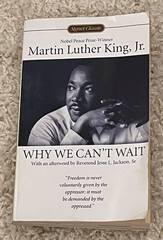 © Michelle Chan More than a year and a half ago, pre-COVID, I saw a pop-up selling used books in the middle of the mall. It was there that I came across this book by Dr. Martin Luther King Jr., “Why We Can’t Wait.” Like most, I had only learned briefly about who Dr. Martin Luther King, Jr. was. That he was a major leader in the Civil Rights Movement in the U.S., and that he used nonviolent protests and civil disobedience as the means to work towards obtaining equality and abolishing racial discrimination. Oh, and of course, his famous “I Have a Dream” speech. I realized that instead of reading about him, I can actually read and “hear” from him directly. This year, as a result of my personal goal to revive my childhood love of books, I finally made time to dive into this work by Dr. King, Jr. With all that has been happening or surfacing in the U.S. over the past year (e.g. COVID-19, murders of African/Black Americans by the police, white supremacists rioting at the Capitol, hate crimes and attacks on Asian Americans, etc.), Dr. King, Jr.’s words stung. Terribly. As a child, I was under the impression that racial discrimination was a thing of the past. Something that we as a society had learned and evolved from, and would never repeat again. It pained me greatly to read the words of Dr. King, Jr., from almost 6 decades ago, and have it still ring so true in 2021. In the book, Dr. King, Jr. mainly focused on what he did to end racial discrimination in Birmingham, Alabama. According to Dr. King, Jr., it was “the most segregated city in America” (36) at the time. He wrote about his decisions, the risks that went along with it, and the mindset he had in making these decisions. In history books, it was made to seem that taking the course of nonviolence was easy. But did you know? It was an extremely organized effort that entailed volunteers being trained to respond in peaceful and nonviolent manners, no matter what was being done to them! For some reason, it wasn’t until I read the words of Dr. King, Jr. that I realized how incredibly difficult it is to not defend oneself when being threatened or harmed. It was also during this time that the Black/African American community's perspective changed, and that “going to jail was no longer a disgrace but a badge of honor” (16). This reframe helped protestors let go of the internal barriers that had been in place before. Dr. King, Jr. wrote about how the road to racial equality needed to be multifaceted. It was not enough to just focus on increasing voter registration to elect officials who believed in racial equality, or to win cases in court, or to protest. Rather, ALL were needed to make a concerted effort. For even if cases were won in court, if we simply wait for those in power to put it into effect, we may end up waiting for eternity. For change to occur, we must each individually make a conscious effort to ensure that we are pushing towards a future where we all have equal treatment. What Dr. King, Jr. and his comrades in the Civil Rights Movement did, not only benefited Black/African Americans and all those who identify as people of color (POC), but American society and the world as a whole. This brief blog post does not do justice to the words and wisdom of Dr. King, Jr. So, please read his words for yourself! On that note, I will end with some of my top 5 inspirational quotes from Dr. King, Jr.’s book: “Nonviolence is a powerful and just weapon. It is a weapon unique in history, which cuts without wounding and ennobles the man who wields it. It is a sword that heals.” (12) “Injustice anywhere is a threat to justice everywhere. We are caught in an inescapable network of mutuality, tied in a single garment of destiny. Whatever affects one directly, affects all indirectly.” (65) "Freedom is never voluntarily given by the oppressor; it must be demanded by the oppressed.” (68) “We who engage in nonviolent direct action are not the creators of tension. We merely bring to the surface the hidden tension that is already alive. We bring it out in the open, where it can be seen and dealt with.” (73) “A social movement that only moves people is merely a revolt. A movement that changes both people and institutions is a revolution.” (107)
0 Comments
|
Michelle Chan, M.A., LMFT Archives
May 2021
Categories
All
|

 RSS Feed
RSS Feed